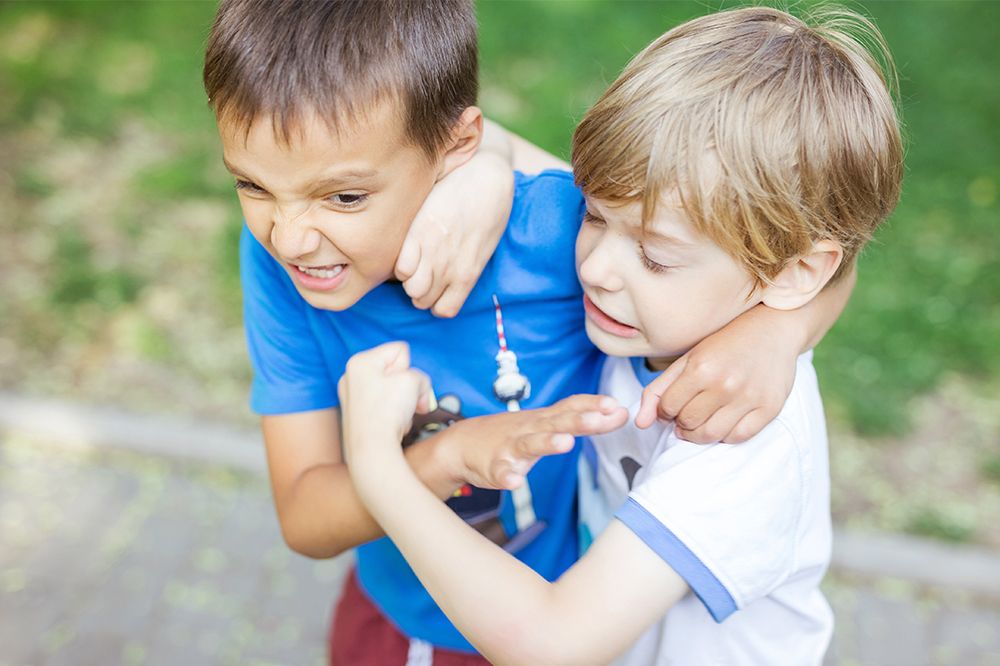Managing Sibling Conflict
Key points:
- It’s totally normal for siblings to fight and the right kind of conflict can actually help their development.
- Siblings fight for a lot of reasons — they don’t know how to manage their emotions, they want attention, they’re jealous, or they’re competing with each other.
- Stopping siblings from fighting is all about setting clear rules, rewarding positive interactions and creating an environment where siblings can thrive together.
- Depending on whether you have young kids or teenagers, your approach to sibling conflict will change. But regardless, modeling good conflict resolution yourself will help your kids get along.
When you have more than one kid, sometimes it might feel like all you’re ever doing is breaking up their squabbles. Sibling conflict can be really challenging to deal with as a parent, but teaching your kids to get along with their peers will help them throughout life.
What is sibling rivalry?
When we talk about sibling conflict, or ‘sibling rivalry’, we mean anything from minor disagreements over which superhero would win in a fight (Batman, obviously), to full-blown wrestling matches in aisle three of the local supermarket.
Sibling rivalry looks different from family to family. Your kids might yell and call each other names, or they could even get physical by shoving, punching or biting.
Is it normal for siblings to fight?
While it may stress you out when your children fight, it can be helpful to know that some forms of conflict are not only normal, but actually useful for their development.
If you have siblings of your own, we’d bet good money that you probably experienced some run-ins with them when you were kids. How you learned to resolve your issues and get along would have helped you develop early skills in conflict resolution, which you probably still use today.
It’s the same with your own kids. Squabbles with their brothers and sisters are teaching them to manage emotions, negotiate, solve problems and practice empathy. Fighting generally isn’t a big problem unless it happens regularly or gets more extreme.
Why do siblings fight?
You may think that your kids fight because they don’t like each other. “You can choose your friends but not your family”, and all that. Of course, they’re entirely different people with different interests and personalities. They may not agree on everything, but not liking each other is rarely the reason for fighting.
Research suggests that your children probably feel they have a better relationship with their siblings than you (their parent) think. So don’t worry about needing to get your kids to be best friends.
There are a range of valid reasons that siblings fight.
They don’t know what to do with their emotions
Remember, children are still learning to understand and control their emotions. They may not know what to do with feelings like disappointment, hurt or frustration, which means they respond in the only way they can think of: by yelling or shoving.
They want your attention
You may notice your kids trying to get you involved in their conflict. You can hear things getting heated in the next room, and know an ear-splitting “Daaaaaaaaad!” is about to erupt. Followed by, “He did this!”, “But SHE did THAT!”
Misbehaving is a way for kids to get your attention. They might stir each other up just to get you to listen to them.
They’re jealous
Jealousy is common in firstborn children, who may resent the new baby for needing your attention. Even when your kids are older, they may get upset with you spending alone time with a sibling. So, they’ll then take it out on their brother or sister.
They’re in competition
This one is often seen in twins, or kids around the same age. Being compared to one another is likely to set off rivalry, leaving siblings competing and trying to out-do each other. Try to steer clear of labels, for example “Mike is the smart one” and “Erica is the creative one”. This could u
nintentionally
set your kids against each other and fuel conflicts.

Do brothers or sisters fight more?
People ask this a lot, and there are lots of myths and misconceptions around how gender affects sibling conflict. Some might say aggressive brothers are more likely to fight, but ask anyone with two teenage daughters and you’ll get a very different answer.
It’s not so much that brothers or sisters fight more, but that there’s often a difference in how they approach conflict.
Brothers tend to get more physically aggressive during conflict, and this is largely due to their dominant hormones (we’re looking at you, testosterone). Sisters on the other hand are more likely to have verbal disputes, which may become more obvious when they reach school years and teenagehood. If you’ve got a boy and a girl, you may see aspects of each.
What about brothers and sisters? Well, age gap is actually more significant when it comes to whether brothers or sisters fight. Research shows that siblings closer together in age are more likely to engage in rivalry and compete with each other.
How to stop siblings fighting
Ah, the golden question! Experts recommend dealing with sibling conflict in the same way you’d respond to other types of misbehavior. Try this:
- Get their attention.
- Tell your children what they need to stop doing (i.e. “stop hitting each other”), and what they need to start doing (i.e. “keep hands and feet to yourselves”).
- If they ignore you, repeat the stop-start instruction.
- If they continue fighting, implement a discipline technique like time out.
This may help when you’re in the thick of it, but there are also things you can do to stop your kids engaging in conflict regularly.
Setting house rules
It’s important that everyone knows what’s allowed and what’s not allowed in your home. Make the rules clear to your kids, either through regular verbal reminders (“we’re not allowed to call each other names”) or by displaying them somewhere in the house. Rules may include how your family treats each other, how kids respect their belongings, how they’re expected to help out, and boundaries for screen time.
Meeting their needs
Kids are more likely to descend into tantrums and foul play when they’re tired, hungry, bored or in need of quality time with you. Ensuring they’ve had enough sleep, that they’re fed, that they have something to do, and that their emotional cup has been filled all work to help reduce conflict.
Rewarding positive interactions
Positive reinforcement is parenting gold. By rewarding your kids when they’re getting along, you can show them that good behavior is the way to go. When you notice them sharing, taking turns and playing nicely, offer verbal praise, special treats or a cameo from you in the game they’re playing.
Modelling good conflict resolution
Kids will pick up social skills from you, so make sure you’re handling your own conflicts well. That can be tough, say if you’re in a co-parenting situation and don’t get along with your ex. But try to communicate and work through disagreements rationally. Don’t resort to voice-raising or name-calling – that’s exactly the sort of behavior you’d discipline your kids for.
Letting siblings work out fights
Talking, debating and arguing can be positive signs that your kids are working through a conflict on their own. There’s no need to swoop in and work it out for them. But we do want to avoid a disagreement turning into verbal or physical aggression.
Listen out for signs that a meltdown is imminent. For example, if voices are getting raised or nasty language is being thrown about. At that point, you might gently offer feedback about how they’re speaking to each other and remind them of the house rules.

How to help siblings get along
Teaching your kids to play well together is like coaching a sports team. You work on your play together, and experience wins and losses together. So when play is going well, everyone gets rewarded. When things get ugly, everyone is dealt the same consequences.
Don’t go all Sherlock Holmes on the situation and make it your mission to solve the mystery of ‘who started it’. You’ll be there all day and you might never figure it out. You’ll also be encouraging your children to tell on each other, rather than trying to work things out on their own. Your actual mission should be to coach the team through conflict resolution. The golden rule here is to provide consequences to both children as a ‘team’. It doesn’t matter who started it, both kids will get a consequence if they fight.
If things start to get rough and you need to intervene, separate your children and get them to play on their own for a period of time, before trying again to play together. If separating them doesn’t work, time-out is an effective method for helping kids regulate their emotions on their own. Make sure you’ve got two (or more) time-out spots available, so your kids are separate while they cool off. Once they’re calm, encourage them to talk about what’s happened and what they might do in future.
Dealing with young siblings fighting
Young children are still learning how to react to their emotions and solve problems. Try some of these tips to deal with young kids fighting:
- Step in before crying starts. When young kids get overwhelmed by emotions, it will be harder for them to calm down and act rationally.
- Stay calm yourself. That’s easier said than done when your kids are driving you up the wall, but keeping your reaction to a minimum will help them see that fighting isn’t a good way to get your attention.
- Talk through issues. Use simple language for young kids, encouraging them to discuss what the problem is and what they think they could do about it.
- Treat siblings fairly. If they’re fighting over a toy, no one should get to have the toy. Consequences should be equal.
Dealing with teenage siblings fighting
When your kids get older and more independent, they’ll fight in different ways. It might be more verbal and require more involved mediation from you. The goal at this age is to help your kids apply empathy and negotiate to find a solution. Try these tips:
- Get them to talk it out. Ask them to think of solutions to the issue and rate those solutions from 1 to 10.
- Encourage empathy. Have each party explain their side and how they feel.
- Motivate them. If something is causing an issue, like managing turns on the computer, take the computer away until they can find a solution.
- Reflect good conflict resolution. Model effective communication and problem solving yourself so your teenagers can see how it’s done.
All siblings fight. Some maybe more than others. But it’s a pretty safe bet that it's something you’ll need to manage at some point as a parent. With these tips and strategies for dealing with sibling conflict, you’ll be a pro at breaking it up and getting everyone on the same page.
If the fighting gets too much, is affecting you or your family members, or is especially aggressive, there’s no harm in getting some help. See a doctor or psychologist for advice or to discuss potential behavior issues. You’ve got this.
Want to learn more?
Movember launched Family Man to improve the confidence and mental health of dads.
Learn how to master kick-ass parenting strategies by getting started with Family Man. It’s an interactive parenting video series that's expert-backed and funded by Movember.
If research is your thing take a closer look at the evidence behind Family Man.
Or learn more before diving in.